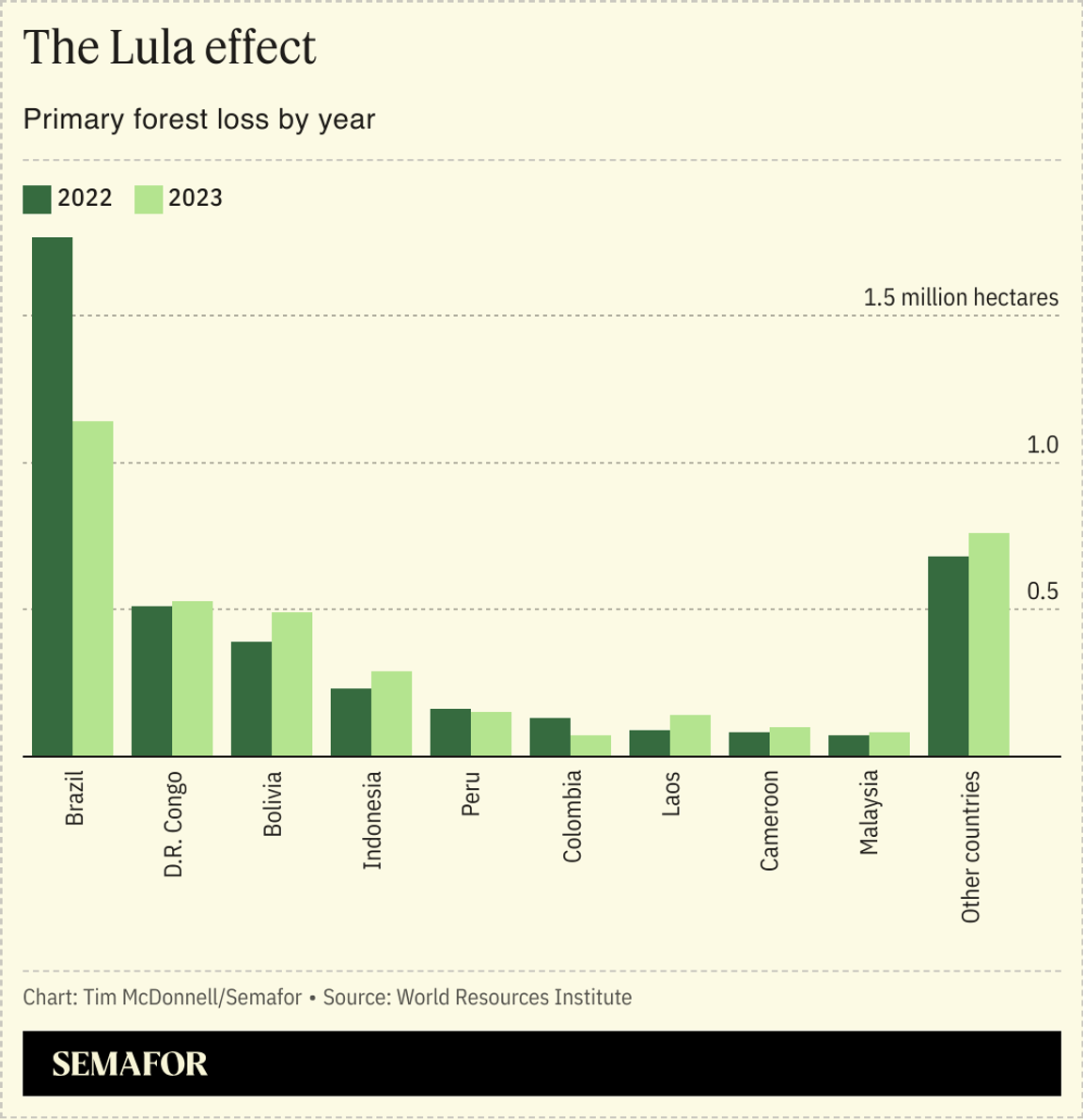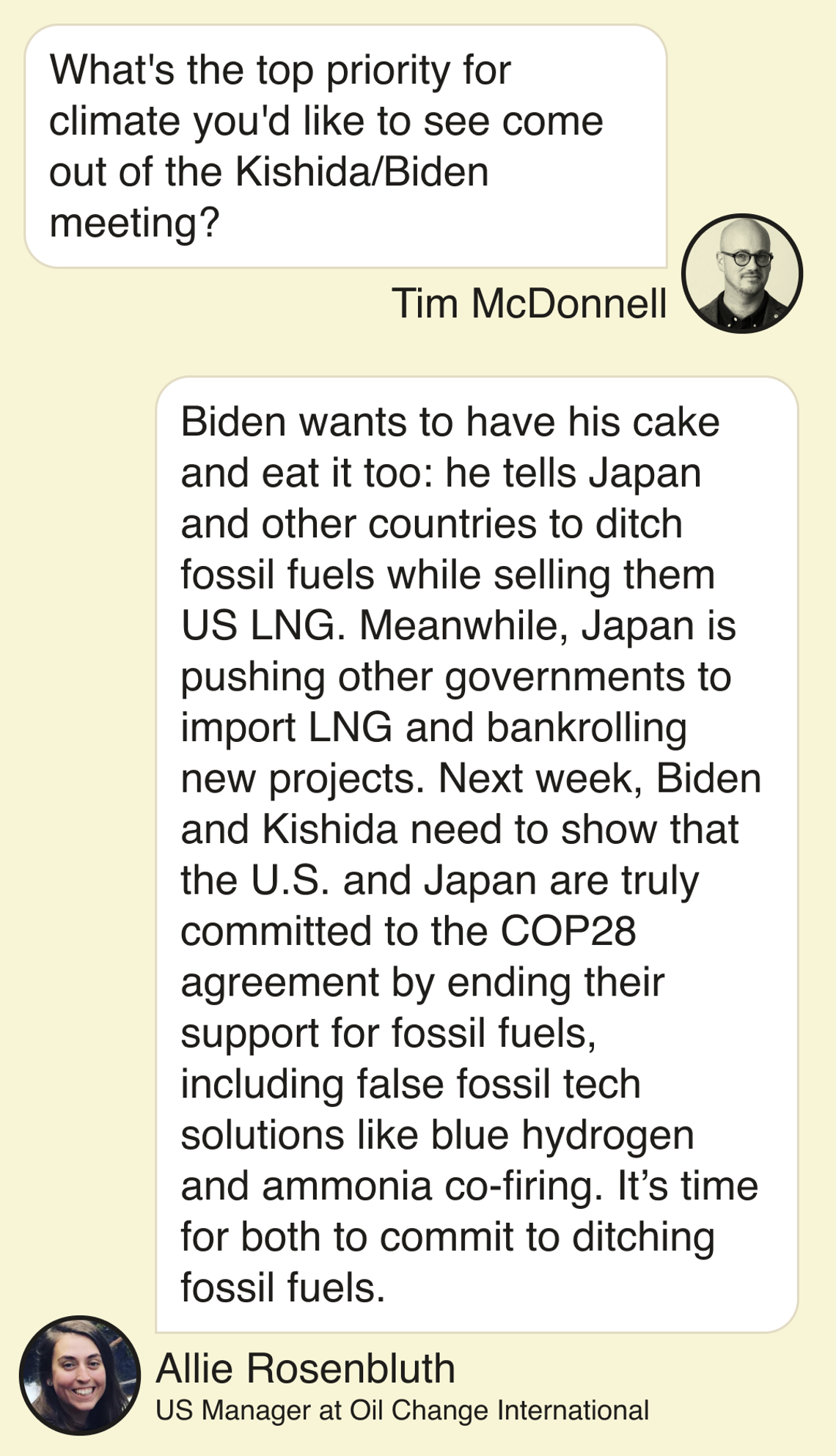| | U.S. clean energy goals are getting snagged on an unlikely alignment of interests.͏ ͏ ͏ ͏ ͏ ͏ |
 - Green banks
- Cuts to tree cutting
- Transmission friction
- Lackluster carbon capture
- Oil market nerves
 Biden’s climate diplomacy with Japan, and mining’s threat to chimps and bonobos. |
|
 Creative Commons Creative CommonsThe Biden administration handed $20 billion in grants to eight nonprofits to jumpstart clean energy projects in low-income communities. The money will be used to open “green banks” to lend money at competitive rates for things like rooftop solar, energy efficiency upgrades, heat pumps, and EV chargers. The money, which comes from the Inflation Reduction Act, is meant to benefit families or small businesses that lack the upfront cash to invest in clean energy hardware and struggle to get loans from conventional banks that are more likely to see climate tech as a risky investment. Republicans in Congress said the Environmental Protection Agency, which is overseeing the fund, is ill-equipped to manage so much cash: Rep. Gary Palmer (R-Ala.) called it a “Green New Deal slush fund” and has introduced legislation to repeal it. |
|
Tropical deforestation fell 9% globally from 2022 to 2023, representing the preservation of an area about the size of Rhode Island.  The steepest improvement was in Brazil, where non-fire-related annual forest losses fell for the first time since 2018, reversing the upward trend established under former President Jair Bolsonaro, according to a new analysis from the World Resources Institute. His successor, Luiz Inácio Lula da Silva, has promised to end deforestation entirely by 2030. Meanwhile, deforestation rates continue to increase in the Congo Basin, where forest clearing for agriculture and charcoal production remains inadequately regulated. |
|
The strange bedfellows slowing a greener US grid |
| |  | Tim McDonnell |
| |
 Flickr FlickrThe U.S. clean energy transition is stalled at a small Mississippi River wildlife refuge on the border between Wisconsin and Iowa. At the end of March, a federal judge temporarily blocked the construction of the last two miles of a 102-mile, $649 million interstate electricity transmission line, siding with a coalition of environmental groups that had sued over its proposed route through the refuge. The energy companies behind the project say they painstakingly selected a course with minimal environmental disruption, following the path of an existing road which will also allow a smaller transmission line that already crosses the refuge to be dismantled. Last week, the companies appealed the injunction, leaving the line’s fate uncertain. The Cardinal-Hickory Creek line is the latest example of a key obstacle to decarbonizing the U.S. electric grid: The long, high-voltage transmission lines needed to carry power from windy and sunny places into cities and factories are being built at a drastically slower pace than what is needed for the country’s clean power goals, in part because of a counterintuitive alignment of interests between some environmental and Indigenous groups, alongside the utilities they often despise. “This line is just the tip of the iceberg,” Kerri Johannsen, energy program director at the Iowa Environmental Council, a nonprofit that has supported the project. A huge number of barriers are holding up transmissions projects across the United States, and environmental litigation, as in the CHC case, is but one: The grinding pace of federal permitting, structural disincentives for utilities to invest in transmission, and in some cases concerted lobbying efforts by utility companies to weaken policy changes that could streamline the process are all also to blame. Federal regulators are expected to issue a new set of rules soon that could address some of these obstacles, potentially amounting to one of the most impactful climate policy reforms of the Biden administration — if it can placate both the community and environmental groups that are blocking transmission projects on cultural or conservation grounds, as well as utilities disinclined to cede control of their local monopolies. |
|
Lackluster carbon capture |
 Emissions that will be captured from U.S. Steel’s biggest plant, in a new deal announced this week. The project, with the Texas startup CarbonFree, will be the first commercial-scale carbon capture facility on a steel plant in the U.S. and will tackle emissions from the Gary Works plant in Indiana, which is the country’s number-four source of CO2 emissions from manufacturing. Yet, it’s a drop in the bucket of the plant’s total emissions. Compared to the more cutting-edge, hydrogen-based green steel projects the DOE targeted for grant funding last week, the U.S. steel project is “deeply unserious,” clean energy advocates told Heatmap. |
|
The price of Brent crude oil hit $91 per barrel on Friday, its highest point since October.  It’s a sign, analysts say, that the market is beginning to price in the risk of supplies being cut short by widening conflict in the Middle East, as Israel braces for a potential retaliation from Iran for hitting Tehran’s consulate in Damascus this week. Up to now the effect on energy markets of the war in Gaza has been muted, but that would change if Israel and Iran come into more direct conflict. Analysts at JP Morgan project the price could top $100 by late summer, a level it last hit in July 2022. Then again, voluntary production cuts by OPEC countries are set to expire before July, which would put more supply on the market as the summer travel season in the U.S. picks up. |
|
 Pete Buttigieg, U.S. Secretary of Transportation; Ali Zaidi, White House National Climate Advisor; Gretchen Watkins, Shell USA President, Mexico’s Finance Minister Rogelio Ramírez de la O; José Muñoz, President & COO, Hyundai Motor Company and Rep. Steny Hoyer (D) Maryland; Chair, Regional Leadership Council will participate in the Future of Mobility Session at the 2024 World Economy Summit. The discussion will revolve around how the world is accelerating towards a faster, greener, and more convenient transportation future while addressing supply chain complications, geopolitical tensions, and regulatory hurdles. April 17 | 2:30 p.m.-5:30 p.m. ET | Washington, D.C. |
|
 Fossil Fuels- Shell expects its gas production for the first quarter to beat its previous forecast, but warned that falling prices will likely mean a drop in profits for the quarter.
FinanceMinerals & Mining Creative Commons Creative Commons- One-third of Africa’s great apes, totaling 180,000 gorillas, bonobos, and chimpanzees, are at risk from critical mineral mining, a new study found. Of planned mining projects in 17 countries, the study found, 20% overlap with critical primate habitats.
EVs- Tesla will send a team to India to explore the possibility of building a factory worth as much as $3 billion. The move comes as officials in New Delhi have cut tariffs for electric vehicle manufacturers in a bid to attract water investment from industry leaders. Tesla CEO Elon Musk said last year he wanted the company to expand to India “as soon as possible,” calling himself “a fan” of Indian Prime Minister Narendra Modi.
- Ford delayed the rollout of a new electric pick-up and SUV as demand for EVs weakens. Production of the much-publicized models will now begin in 2026, a year behind schedule, the company announced. EV sales growth slowed to 2.7% in the first quarter of 2024, down from a 47% increase for all of 2023.
Food & Agriculture- The next round of climate litigation may target livestock companies. An article this week by Yale Law School researchers argued that the methane emissions of big beef producers could leave them just as legally liable for climate damages as an oil company.
Personnel- House Republicans are escalating their inquiry into International Energy Agency director Faith Birol. A letter this week from Reps. Cathy McMorris Rodgers (R-Wash.) and Jeff Duncan (R-S.C.) complained that the IEA “has lost focus of its energy security mission and has instead shifted attention and resources to climate policy advocacy.”
|
|
Allie Rosenbluth, US Manager at Oil Change International. Next week, Japanese Prime Minister Fumio Kishida will meet President Biden in Washington, where energy and Nippon Steel’s proposed acquisition of U.S. Steel will be on the table.  |
|
| |